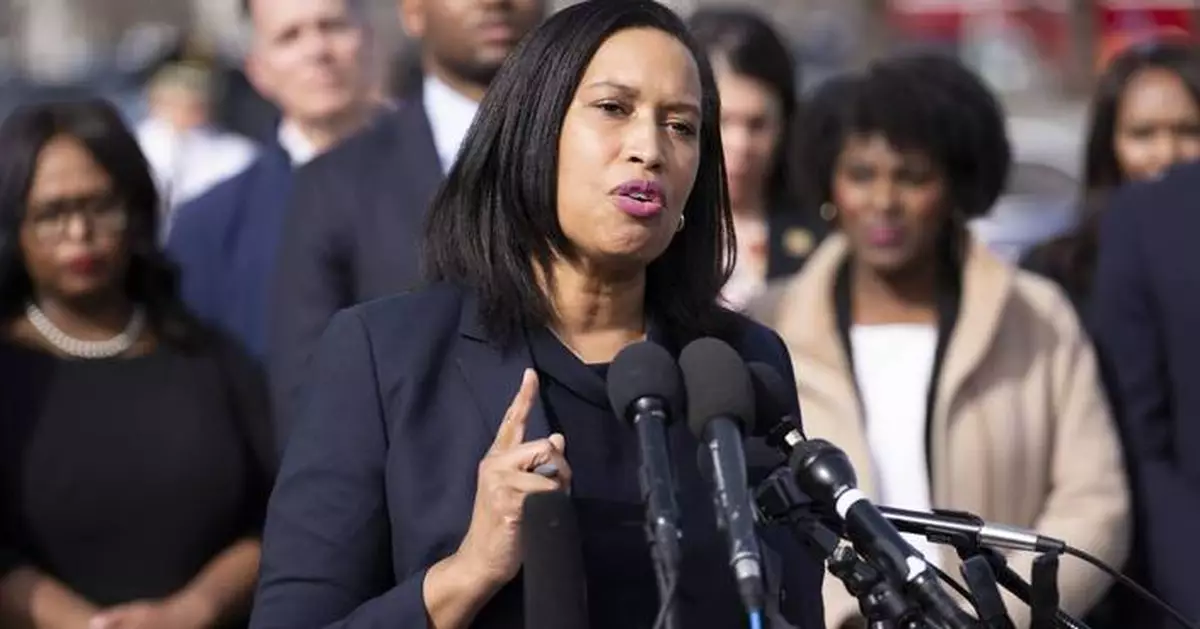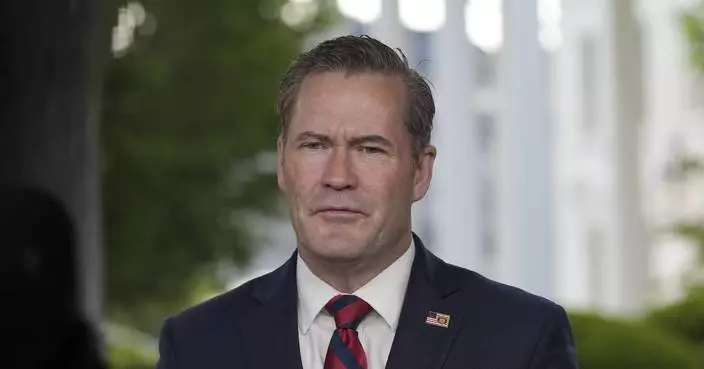WASHINGTON (AP) — Washington, D.C., which has often had a tenuous peace with the federal government when Republicans controlled Congress and the White House, is now facing its most urgent threat since it was given the power of Home Rule during the Nixon administration.
The funding bill passed by the House this week calls for cuts in D.C. spending of $1.1 billion, a drastic cut that city officials said would treat the city like any federal agency and would result in a calamitous reduction in services ranging from schools to public safety.
Combined with criticisms last month from President Donald Trump who said that Washington, D.C. would be better off under total federal control, and two Republicans who have offered legislation to do just that, Democrats see Republicans as trying to wrest self-governance from the capital city. District officials have now turned their efforts urgently to the Senate, where they are pushing for lawmakers to reject the House approach.
The House spending bill holds the city's budget at fiscal year 2024 numbers, even though the District's 2025 budget is based on its own revenue and had already been approved by Congress. Republicans rejected requests from Mayor Muriel Bower and the district's non-voting Delegate to Congress, Eleanor Holmes Norton, to simply follow past practice.
“The pace with which they are moving is different,” said Christina Henderson, a member of the DC City Council. ”You could call it reckless. This is very uncharted territory for us."
Jasmine Tyler, executive director of the Justice Policy Institute, said if the budget plan goes through, then the very thing Republicans have complained about, such as crime — which decreased last year — will immediately be impacted. “It will happen overnight,” she said. “This means law enforcement, teachers, public service cuts. Is the trash going to be collected?”
“You can’t un-ring this bell,” Tyler said.
The Constitution gives Congress authority over the District. That once meant Congress and federally-appointed commissioners ran the city, sometimes leaving members fielding complaints on local services. But Home Rule passed in 1973 allowing residents to elect a mayor, a city council and neighborhood commissioners to run day-to-day operations while Congress maintains its control of the city, including approving laws the Council passes and the city’s budget.
Over time, members have used that authority to impose cultural standards, such as stopping the city from using its own funds for a needle exchange program as it battled high rates of HIV/AIDS to win points in their home states and districts. One of its most recent reversals came in 2023 when Congress rejected the city’s criminal justice reform law.
Michael Fauntroy, professor of policy and government at George Mason University and author of a book on Home Rule, said that “there’s no legitimate justification for it now. The district government runs pretty well for as a municipal corporation.”
He said the cuts would set in motion a cascade of service reductions, including fewer police, that could be the pretext for Congress taking over the city more directly.
Officials have shied away from talking directly about home rule. A spokesman for Bowser said in a text that she was focusing her attention on trying to persuade the Senate to change the House version of the legislation. Norton expressed similar sentiments in an emailed statement.
The city, which had been home to about seven percent of the federal workforce, has been reeling from actions by the Trump administration and its Department of Government Efficiency, and recalibrating what spending cuts will be needed in coming years as thousands of people lose their jobs. Historically, federal jobs have helped lift generations of workers, many of them Black residents, into the middle class by giving them opportunities they would not have had in the private sector because of racial discrimination.
Bowser has tried to accommodate Trump's concerns as well as those of Republicans, including removing the Black Lives Matter Plaza erected in 2020, one block from the White House. During the March 10 press conference, Bowser said she had been in contact with the administration about the House proposal and “they indicated this didn’t come from them.”
If the Senate does amend the plan, the House, which is now in recess, would have to come back to the city and approve it by Friday night to avert a shutdown.
Several senators have already indicated they will oppose the spending plan, including Maryland Democrat, Sen. Chris Van Hollen. He said, on the social media platform X, that he planned to introduce a proposal to reverse what the House has done with D.C., calling their actions “undemocratic and un-American.”
John Capozzi Jr., a former shadow representative for the District, said he knew the city’s future was not good when he saw the mayor, council members and Norton holding a press conference on Capitol Hill urging the House to step away from its proposal prior to the vote.
“If they could just make a couple phone calls and end this, it would have happened already,” he said. The question now, he added, is: “Will the senators die on the field for the D.C. budget?”
Monica Hopkins, executive director of the American Civil Liberties Union of D.C. said one thing may stop the Republican effort from outright repeal of local control: the realization that if Congress were to actually revoke Home Rule, then they also would be responsible for the city's problems.
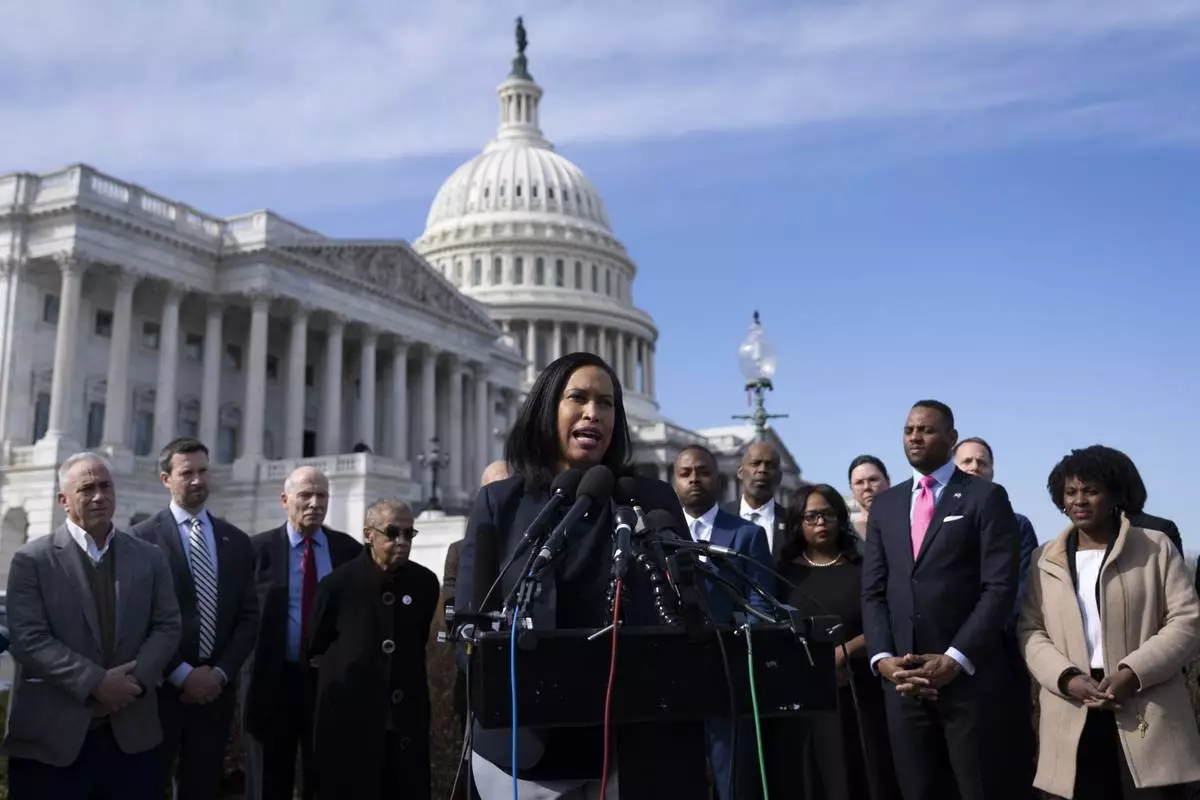
District of Columbia Mayor Muriel Bowser speaks at a news conference to address the impact of the proposed continuing resolution, on Capitol Hill in Washington, Monday, March 10, 2025. (AP Photo/Ben Curtis)

Del. Eleanor Holmes Norton, D-D.C., speaks at a news conference to address the proposed continuing resolution and its impacts, on Capitol Hill in Washington, Monday, March 10, 2025. (AP Photo/Ben Curtis)
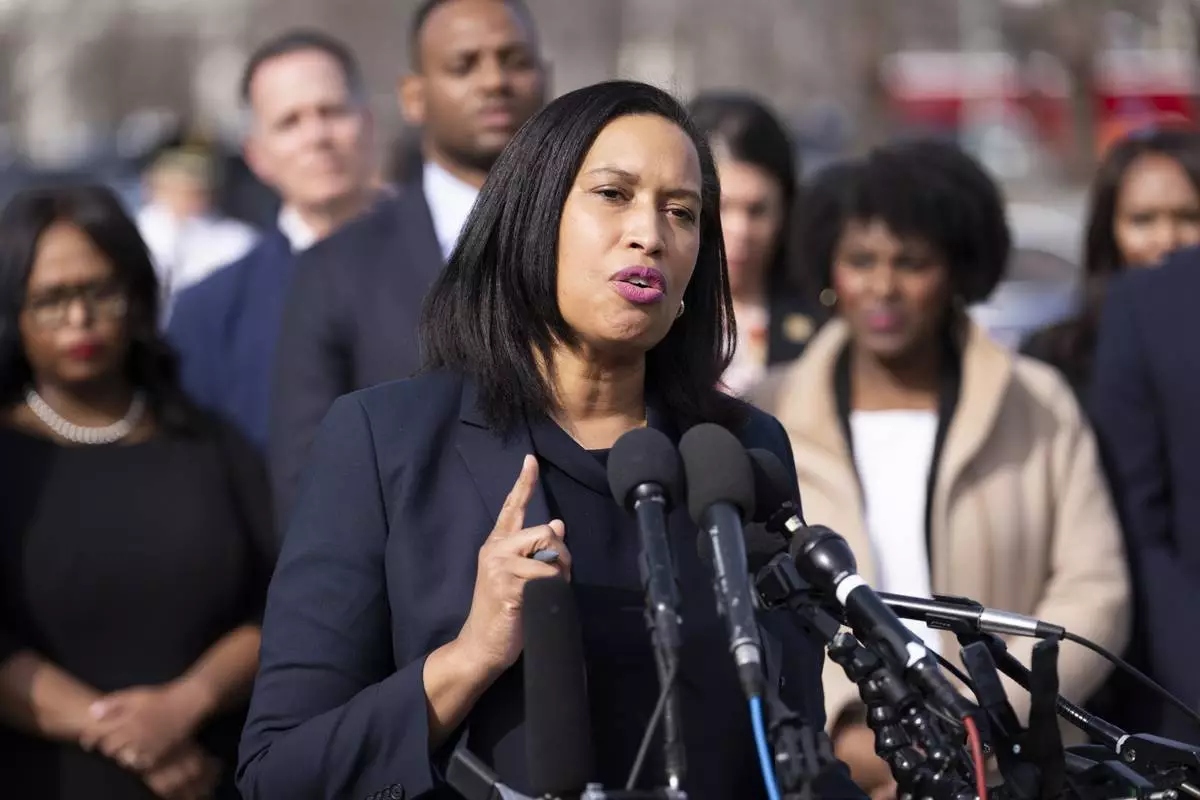
District of Columbia Mayor Muriel Bowser speaks at a news conference to address the impact of the proposed continuing resolution, on Capitol Hill in Washington, Monday, March 10, 2025. (AP Photo/Ben Curtis)
President Donald Trump’s administration released a lengthy review of transgender health care on Thursday that advocates for a greater reliance on behavioral therapy rather than broad gender-affirming medical care for youths with gender dysphoria.
The 409-page Health and Human Services report questions standards for the treatment of transgender youth issued by the World Professional Association for Transgender Health and is likely to be used to bolster the government’s abrupt shift in how to care for a subset of the population that has become a political lightning rod.
Major medical groups and those who treat transgender young people sharply criticized the new report as inaccurate.
This “best practices” report is in response to an executive order Trump issued days into his second term that says the federal government must not support gender transitions for anyone under age 19.
“Our duty is to protect our nation’s children — not expose them to unproven and irreversible medical interventions,” National Institutes of Health Director Dr. Jay Bhattacharya said in a statement. “We must follow the gold standard of science, not activist agendas.”
The report questions the ethics of medical interventions for transgender young people, suggesting that adolescents are too young to give consent to life-changing treatments that could result in future infertility. It also cites and echoes a report in England that reinforced a decision by its public health services to stop prescribing puberty blockers outside of research settings.
The report accuses transgender care specialists of disregarding psychotherapy that might challenge preconceptions, partly because of a “mischaracterization of such approaches as ‘conversion therapy,’” which about half the states have banned for minors.
The American Academy of Child & Adolescent Psychiatry has said evidence shows conversion therapies inflict harm on young people, including elevated rates of suicidal thoughts.
HHS said its report does not address treatment for adults, is not clinical guidance and does not make any policy recommendations. However, it also says the review “is intended for policymakers, clinicians, therapists, medical organizations, and importantly, patients and their families,” and it declares that medical professionals involved in transgender care have failed their young patients.
The report could create fear for families seeking care and for medical providers, said Shannon Minter, the legal director at the National Center for Lesbian Rights. “It’s very chilling to see the federal government injecting politics and ideology into medical science,” Minter said.
“It’s Orwellian. It is designed to confuse and disorient,” Minter added.
Child and adolescent psychiatrist Dr. Scott Leibowitz, a co-author of the influential WPATH standards for youth, said the new report “legitimizes the harmful idea that providers should approach young people with the notion that alignment between sex and gender is preferred, instead of approaching the treatment frame in a neutral manner.”
While Health Secretary Robert F. Kennedy Jr. has repeatedly pledged to practice “radical transparency,” his department did not release any information about who authored the study. The administration says the new report will go through a peer-review process and will only say who contributed to the report after “in order to help maintain the integrity of this process.”
The report contradicts American Medical Association guidance, which urges states not to ban gender-affirming care for minors, saying that “empirical evidence has demonstrated that trans and non-binary gender identities are normal variations of human identity and expression.”
It also was prepared without input from the American Academy of Pediatrics, according to its president, Dr. Susan Kressly.
“This report misrepresents the current medical consensus and fails to reflect the realities of pediatric care,” Kressly said. She said the AAP was not consulted “yet our policy and intentions behind our recommendations were cited throughout in inaccurate and misleading ways.”
Dr. Jack Drescher, a New York psychiatrist and psychoanalyst who works on sexual orientation and gender identity issues, said the report is one-sided and “magnifies the risks of treatments while minimizing benefits.”
The Trump administration’s report says “many” U.S. adolescents who are transgender or are questioning their gender identity have received surgeries or medications. In fact, such treatments remain rare as a portion of the population. Fewer than 1 in 1,000 adolescents in the U.S. received gender-affirming medication — puberty blockers or hormones — according to a five-year study of those on commercial insurance released this year. About 1,200 patients underwent gender-affirming surgeries in one recent year, according to another study.
Gender-affirming care for transgender youth under standards widely used in the U.S. includes developing a plan with medical experts and family members that includes supportive talk therapy and can — but does not always — involve puberty blockers or hormone treatment. Many U.S. adolescents with gender dysphoria may decide not to proceed with medications or surgeries.
Jamie Bruesehoff, a New Jersey mom, said her 18-year-old daughter, who was assigned male at birth, identified with girls as soon as she could talk. She began using a female name and pronouns at 8 and received puberty blockers at 11 before eventually beginning estrogen therapy.
“She is thriving by every definition of the word,” said Bruesehoff, who wrote a book on parenting gender-diverse children. “All of that is because she had access to this support from her family and community and access to evidence-based gender-affirming health care when it was appropriate.”
A judge has blocked key parts of Trump’s order, which includes denying research and educational grants for medical schools, hospitals and other institutions that provide gender-affirming care to people 18 or younger. Several hospitals around the country ceased providing care. The White House said Monday that since Trump took office, HHS has eliminated 215 grants totaling $477 million for research or education on gender-affirming treatment.
Most Republican-controlled states have also adopted bans or restrictions on gender-affirming care. A U.S. Supreme Court ruling is pending after justices heard arguments in December in a case about whether states can enforce such laws.
The Jan. 28 executive order is among several administration policies aimed at denying the existence of transgender people. Trump also has ordered the government to identify people as either male or female rather than accept a concept of gender in which people fall along a spectrum, remove transgender service members from the military, and bar transgender women and girls from sports competitions that align with their gender. This month, HHS issued guidance to protect whistleblowers who report doctors or hospitals providing gender-affirming care. Judges are blocking enforcement of several of the policies.
This latest HHS report, which Trump called for while campaigning last year, represents a reversal in federal policy. The U.S. Substance Abuse and Mental Health Services Administration, which is part of HHS, found that no research had determined that behavioral health interventions could change someone’s gender identity or sexual orientation. The 2023 update to the 2015 finding is no longer on the agency’s website.
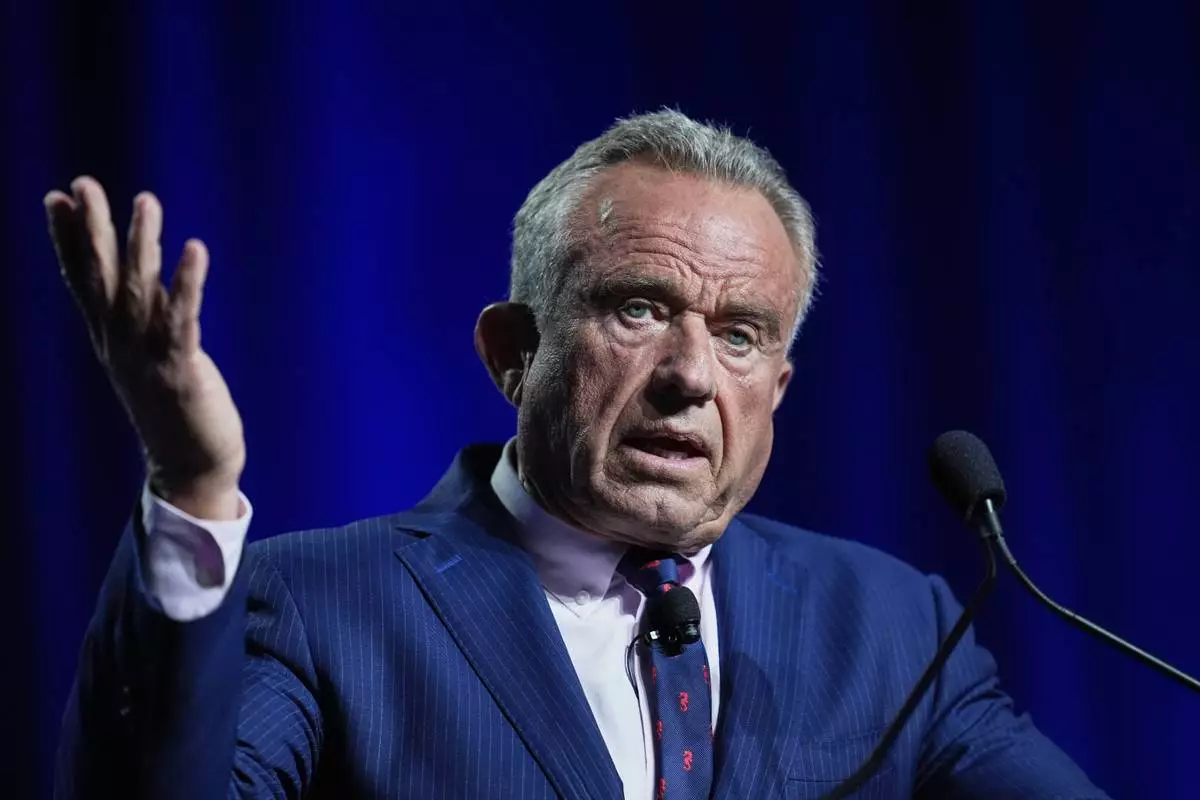
FILE - Health and Human Services Secretary Robert F. Kennedy Jr. speaks at the Rx and Illicit drug Summit, April 24, 2025, in Nashville, Tenn. (AP Photo/George Walker IV, File)
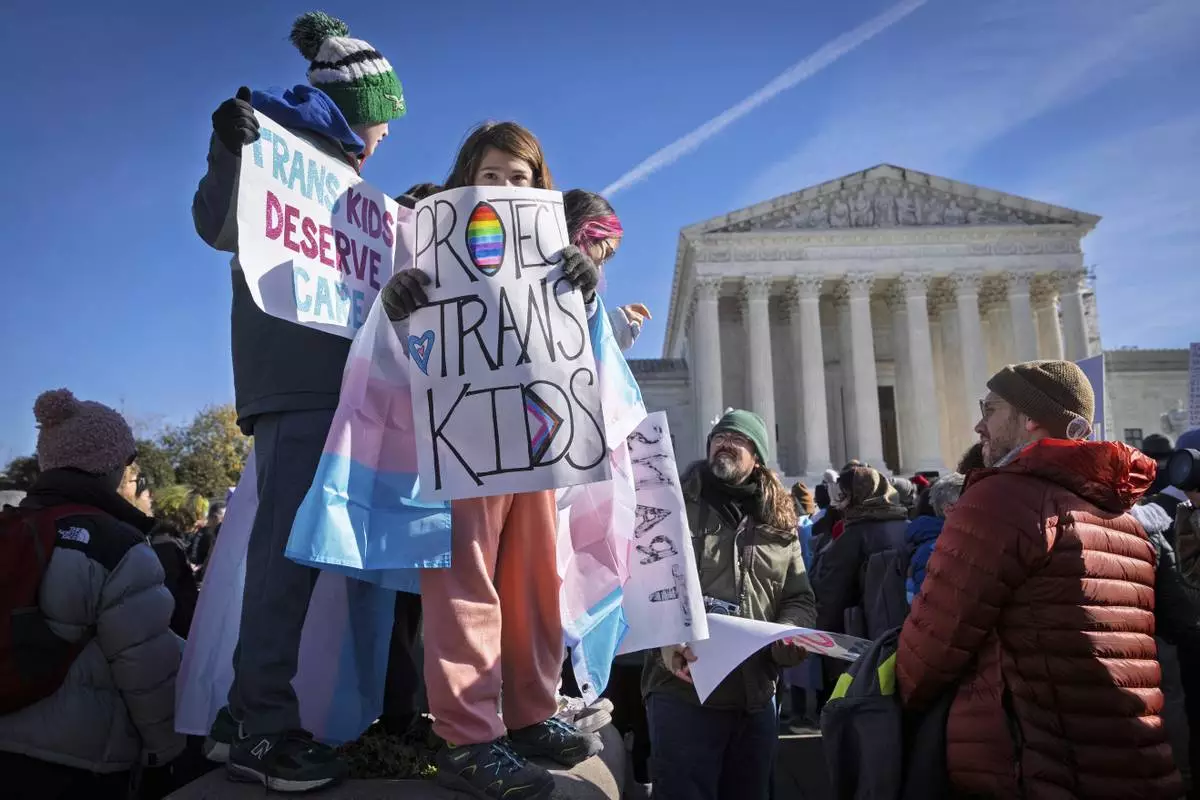
FILE - Children hold signs and transgender pride flags as supporters of transgender rights rally by the Supreme Court, Dec. 4, 2024, in Washington. (AP Photo/Jacquelyn Martin, File)
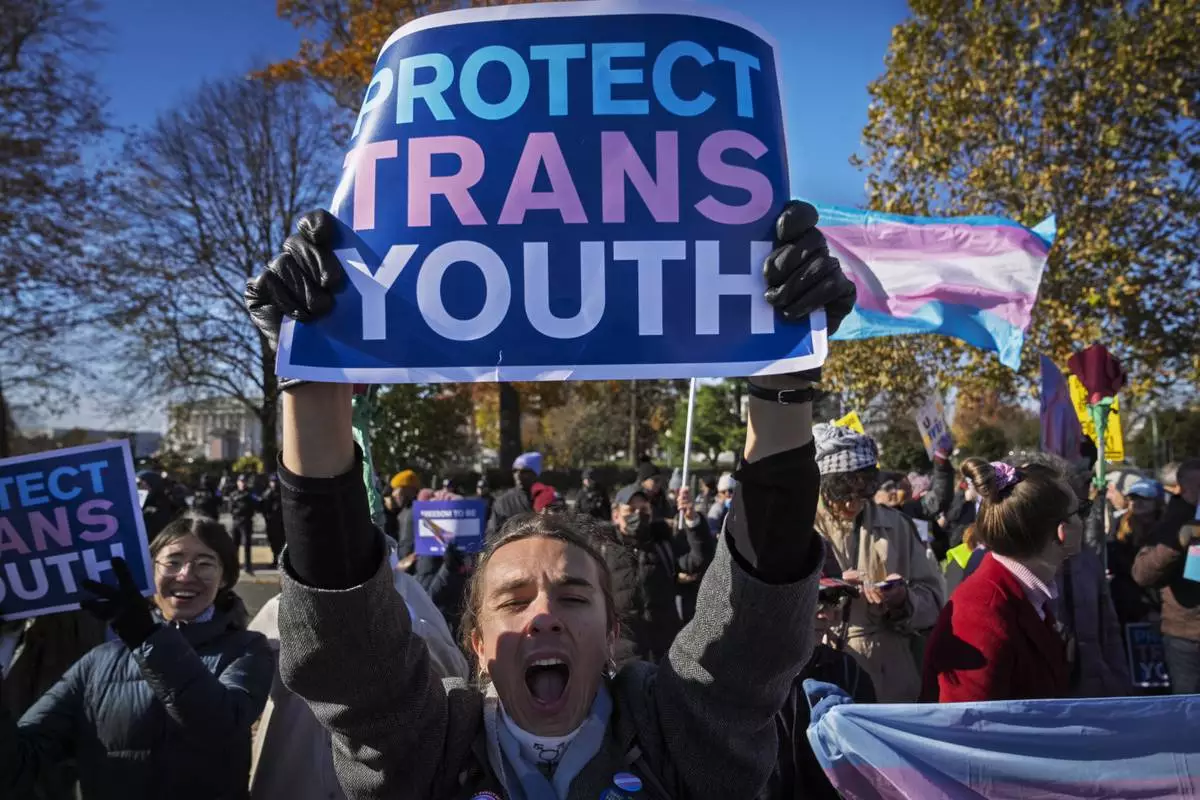
File - Supporters of transgender rights rally by the Supreme Court, Dec. 4, 2024, in Washington. (AP Photo/Jacquelyn Martin, File)

FILE - President Donald Trump holds up an executive order after signing it at an indoor Presidential Inauguration parade event in Washington, Jan. 20, 2025. (AP Photo/Matt Rourke, File)





